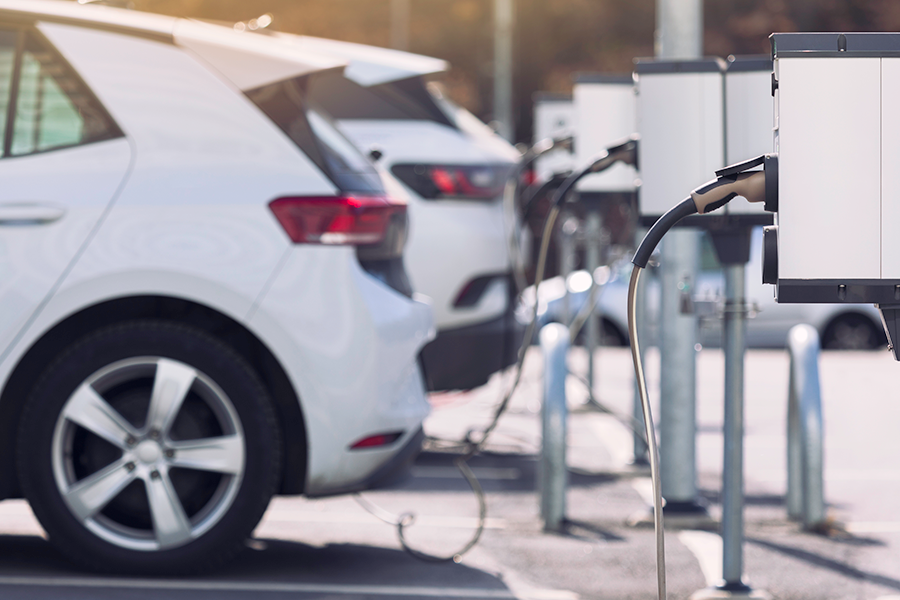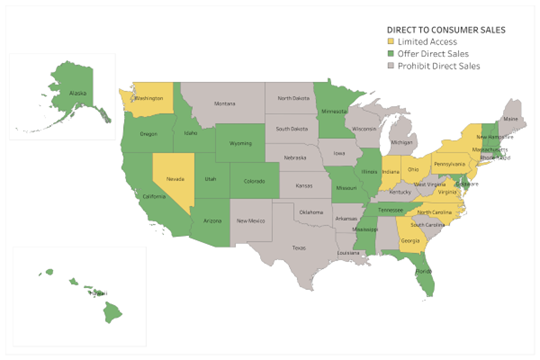Tapping into North Carolina’s Electric Vehicle Potential: The Power of Direct Sales

As North Carolina (NC) strives for a more sustainable future, the adoption of electric vehicles (EVs) offers a compelling solution for reducing carbon emissions and promoting clean transportation. However, current restrictions on EV sales in NC limit consumers to traditional dealership models, with only Tesla being allowed to sell directly to consumers. It is time for NC to embrace the advantages of expanding direct sales of EVs and allow more automakers to sell their vehicles directly to North Carolinians, especially considering major economic investments being made in the state by manufacturers to develop those vehicles here (Vinfast, Arrival, and Toyota to name a few). This expansion prioritizes consumer choice, convenience, and access to information while also delivering significant day-to-day cost savings for consumers. EVs offer consumers notable savings in fuel costs, maintenance expenses, and tax benefits. By taking these steps, the state not only can create a competitive marketplace that fosters innovation, propels sustainable growth, and solidifies NC as a leader in the clean transportation movement but also provide consumers with tangible day-to-day cost savings.
Breaking Free from Restrictive Policies:
The passage of Senate Bill 384 in 2019 opened the door for direct-to-consumer or ‘Freedom to Buy’ sales in North Carolina, however, the bill outlined very stringent criteria designed exclusively for one automaker in the state. To qualify for this privilege, automakers are required to establish a robust presence through motor vehicle dealership locations within the state and commit solely to manufacturing and selling plug-in electric vehicles. However, this exclusivity presents challenges, as it hampers healthy competition and limits the diversity of options in North Carolina’s EV market.
Achieving the Goals of Executive Order 246:
Providing consumers the Freedom to Buy from whoever they’d like in North Carolina opens the door to lower upfront prices and additional EV options, that are otherwise unavailable through the traditional dealer network. Providing access to additional EV options is critical as demand continues to outweigh supply and as we strive to hit the state’s goal of 1.25 million registered zero-emission vehicles (ZEVs) on the road by 2030.
This goal was previously established via Governor Cooper’s Executive Order (EO) 246, which sets ambitious goals for the state’s transition to zero-emission vehicles (ZEVs). The EO outlines goals of at least 1.25 million registered ZEVs and 50 percent of in-state new vehicle sales as zero-emission by 2030. Expanding the direct sales of EVs is crucial in reaching these goals. By allowing multiple automakers to sell their electric vehicles directly to consumers, North Carolina can enhance the availability and accessibility of ZEVs. This would facilitate the transition to sustainable transportation and help lower emissions in the highest emitting sector in North Carolina’s economy.
States That Currently Allow Direct Sales of EVs:
Freedom to Buy auto sales is not a new concept and is something that’s currently embraced by numerous states across the country. However, other states, like North Carolina, either require sales of vehicles through a traditional dealer network, preventing market participation from many EV companies. It is time for North Carolina to remove its barriers to allow more automakers to sell their vehicles directly to consumers.

The Untapped Potential of the EV Market:
Expanding direct sales of EVs in NC offers numerous advantages that benefit consumers, the market, and the environment.
- Empowering Consumer Choice and Convenience: By broadening the selection of EV models available through direct sales, consumers gain access to a wider range of options that cater to their preferences, needs, and budgets. This expansion simplifies the purchase process, offering a streamlined buying experience that saves time, money, and effort.
- Elevating Education and Awareness: Direct sales help educate consumers about EV benefits, charging infrastructure, government incentives, and more. This empowers individuals to make informed decisions and contributes to the EV market’s growth. Increased consumer knowledge of EVs, including sustainability, cost savings, and technological advancements, debunks misconceptions and boosts confidence in EV adoption, driving innovation and investment in the EV industry.
- Streamlining the Purchase Experience: With direct sales, consumers can conveniently order EVs online, customize their vehicles according to their preferences, and benefit from transparent pricing. This eliminates the hassle of excessive paperwork and negotiations often associated with dealership sales, making the purchasing process more efficient and transparent.
- Driving Economic Growth and Job Creation: Expanding direct sales of EVs creates new job opportunities in sectors such as sales marketing, customer support, and manufacturing. This expansion not only drives economic growth but also strengthens the state’s economy and supports local communities. The resulting job creation and economic expansion has a positive impact, fostering community development and improving the well-being of individuals and businesses. Additionally, the growth in EV sales attracts investments and stimulates consumer spending.
- Reducing Environmental Impact: Embracing direct sales aligns with North Carolina’s commitment to reducing carbon emissions. By transitioning to EVs, the state can decrease its reliance on fossil fuels, reduce emissions in the highest emitting sector of the economy (transportation), and work towards achieving electric transportation goals outlined in Executive Order 246.
By highlighting these benefits, it becomes clear that expanding direct sales of EVs in North Carolina is a pivotal step towards a cleaner, more economical future. This expansion not only grants consumers more choices and convenient options but also fosters economic growth, job creation, and environmental sustainability. This expansion will help North Carolina tap into the full potential of the EV market and contribute to the state’s transition to a cleaner transportation system.

